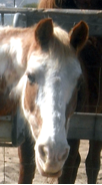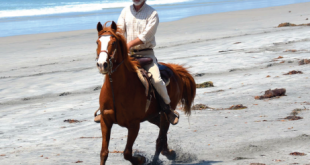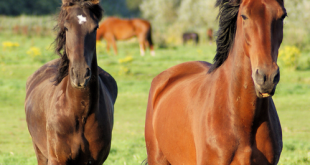 The distress message came early Tuesday morning. Dawn Stephens, one of the co-founders of Tina Jo’s Promise, a horse rescue, called to say that Indigo had colicked over the weekend. While he was tenuously on the mend, recovery was still a long way off. Could I come down to Punta Banda and “work my magic on him?”
The distress message came early Tuesday morning. Dawn Stephens, one of the co-founders of Tina Jo’s Promise, a horse rescue, called to say that Indigo had colicked over the weekend. While he was tenuously on the mend, recovery was still a long way off. Could I come down to Punta Banda and “work my magic on him?”
As an equine massage therapist, I had treated Indigo regularly over the last few months. He was the elder statesman of the rescue, a sweet, calm paint horse who had been a hard working trail mount and was sent to the ranch to live out his days in relaxation. Hopefully my sessions helped relieve his pain and stiffness. Colic was another thing entirely. The word colic encompasses many gastrointestinal issues—from excess gas to impaction to intestinal torsion—and it makes any horse owner’s blood icy with fear.
The local horse vet had treated Indigo, but he was still lethargic, cold to the touch, and dehydrated. We put in another call to the vet to return to give him IV fluids.
While waiting for the vet to arrive, Indigo’s symptoms worsened precipitously. His legs buckled, and he dropped to the ground, thrashing in pain. Several times he rose, stumbled a few feet, then fell again, until he was too weak to get up. He lay straining in the sand, grunting with pain, his legs shaking. We did the best we could to make him comfortable, keeping his tongue moist and shading his eyes, stroking his face, praying the vet would pull up soon. But minutes later, after a few agonal breaths, Indigo’s eyes rolled back in his head, and he passed from this world into the next.
Indigo’s death from colic may have been inevitable, but the way he died could have been much different. Equine vets in Baja are few in number and stretched thin between far flung clients on rough roads. They run all day from one emergency to another, making do with scant resources. Indigo’s passing was the motivation Dawn Stephens needed to make her dream of building an animal hospital in Punta Banda a top priority. Construction had already begun in a corner of the rescue, and now the project has been accelerated, so the next horse that falls prey to colic won’t have to suffer like Indigo.
In addition to handling community equine emergencies, the hospital will offer chryptorchid castrations and post-surgery constant care services. Vet techs and interns will be on hand when doctors are unavailable, and even small animal urgent care and clinics will be accommodated.
It costs roughly $200 per month to maintain each horse, and they have nine, with the likelihood of another filling Indigo’s stall soon, though no horse will ever truly take his place.
 Baja Review A community newspaper serving Ensenada, Valle de Guadalupe, and Rosarito in Northern Baja California
Baja Review A community newspaper serving Ensenada, Valle de Guadalupe, and Rosarito in Northern Baja California


